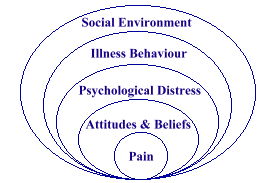
Guide to Assessing Psychosocial Yellow Flags in Acute Low Back Pain: Risk Factors for Long-Term Disability and Work Loss
Appendix 1: What does ‘Psychosocial’ mean?
The term psychosocial refers to the interaction between the person and their social environment, and the influences on their behaviour.
- The social environment includes family members, friends, people at work, employers, the compensation system and health professionals.
- Any of these people have the potential to affect a person with back pain.
- These interactions may influence behaviour, levels of distress, attitudes and beliefs and subjective experiences of pain.
- Even well intentioned actions can inadvertently result in counterproductive outcomes.
- The biopsychosocial model of back pain and disability emphasises the interaction between multiple factors.

Differentiating acute, recurrent, and chronic back pain
Before proceeding to assess Psychosocial Yellow Flags it is important to differentiate between acute, recurrent, and chronic presentations. Evidence suggests that treating chronic back pain as if it were a new episode of acute back pain can result in perpetuation of disability.
This is especially true if treatment providers:
- rely on a narrow medical model of pain and emphases short-term palliative care, with no long-term management plan
- discourage self care and fail to instruct the patient in self management
- sanction disability and don't provide interventions that will improve function
- over-investigate and perpetuate belief in the ‘broken part hypothesis’